
How AI Is Transforming Ecommerce Business
- By James Wilson
- 17-11-2021
- Artificial Intelligence
When the word Artificial Intelligence strikes, it indeed brings back the reminisce of Stephen Spielberg's 2001 film AI Artificial Intelligence, sci-fi thriller Ex Machina, or 1982 cult classic Blade Runner. However, we are not talking about movies here but how Artificial Intelligence is taking over the revolutionary transformation in eCommerce.
AI in eCommerce is less about human robots and more about exercising them in your eCommerce basic foundation in providing the best user experience to your customers.
Machine learning circumscribed in the fences of scientific research is swiftly entering the eCommerce industry from customer services to building more market and branding.
AI has potentially transformed the market and stood up as a robust eCommerce industry trend and the business for online retailers in terms of data accumulation, studying consumer patterns, making alterations based on behaviors and predictions for the future, and above all, consumer services.
And that says why companies are leveraging Artificial Intelligence to their best potential to reduce operational costs and craft more comprehensive and customized user experiences to stay ahead of the curve. And with technology expanding its realms, businesses are rushing to grasp over it and make the best out of it.
The artificial intelligence market is expanding with leaps and bounds. At the same time, it is also expected to touch $10.9 billion by 2026, market growth in six-fold from its earlier value of $1.8 billion in 2020.
That said, this article will guide you through all the nuances of Artificial Intelligence in eCommerce and how you can make the best from this technology to magnify your business.
AI Is Bringing Change to the Ecommerce Industry
It's important to understand that, Artificial Intelligence isn't just a regular fancy fad technology trend for its cool factor. It has the potential to revolutionize businesses and market patterns, and that's not specific to the eCommerce industry only. Instead, all business functions create a paradigm shift in virtually every sector of the tech industry.
That very famous line from researchers- The one who controls data controls the future! But how is AI related to data?
Artificial intelligence, a wide-ranging branch of computer science with innovative machine intelligence, can perform tasks that are typically still far from human capabilities alone. To understand it better, we shall dive a little further into the components of Artificial Intelligence.
Artificial intelligence interprets itself in broad segments which constitute data mining, machine learning, and natural language processing.
● And there, it comes "Data". Data mining is the combination of historical and current data to identify patterns and predictions.
● The process of computers interpreting human language and the human-computer reciprocity is called Natural language processing.
● Machine learning works out with a compilation of algorithms and uses past experience to undermine a problem. Additionally, Deep learning works on the concept of layering algorithms to understand "data" in more depth.
Primarily over the last couple of years, Artificial Intelligence has rooted and evolved deeply to become a robust mechanism to boost sales and performance. While the big fishes are already grasping tight hands on this, small businesses are also fastening their pace with what Artificial Intelligence has for them to offer.
Six Major AI Applications in E-commerce
Despite several advantages of using artificial intelligence in eCommerce, we have highlighted the primary four that govern the eCommerce industry today.
1. Chatbots and other virtual assistants
Chatbots are increasingly utilized by almost all websites today. However, eCommerce websites and retailers are advancing their pace towards digital assistants and chatbots to ease their online customer's journey 24*7.
Powered by the Artificial Intelligence tool, chatbots spontaneously deliver a consistent and smooth customer experience.
Nonetheless, customer support is not only where chatbots are confined. Instead, they are also progressing their capabilities in following other segments:
● Self-learning skills enhancing with time.
● Natural language processing (or NLP) reads and interprets voice queries with online visitors.
● Presents personalized offers to online shoppers.
● Delivers instant online assistance to website visitors without having them wait.
2. Intelligent Product Recommendations
With almost every marketing gimmick already put forward, what else's left to take over the market? Personalization is the best step forward in 2021, and with AI taking over, it is growing more dynamically.
While several other prominent artificial intelligence applications are taking over, personalized product recommendations powered by AI are increasing the conversation rates of online website visitors to customers by 915% and average order values taking over by 3%.
Big data accumulate customers' buying history and information, identifying buying patterns by previous purchases, most searched products, and browsing history to provide better customer product recommendations. Online retailers utilize Product recommendations to their best advantage for their eCommerce website in multiple ways:
● Increasing numbers of customers returning to shop.
● Customers spend more time on the website, further increasing customer retention and improving sales.
● Personalized email and business campaign.
3. AI Personalization in Ecommerce
eCommerce marketers rate personalization to be one of the most effective modes of marketing and at the core of AI in eCommerce. AI combined with machine learning is procuring important user insights from the acquired user information from every specific online user.
There are several AI-enabled tools that, through the help of several touchpoints (like mobile apps, websites, email campaigns), recognize the customer data and identify patterns and functions according to their online interactions.
These insights assist online retailers in custom product recommendations and provide a uniform user experience across all devices and channels.
4. Inventory Management
Building a competent and adequate inventory management system requires catering to the market conditions and demands without over-compiling the idle stock.
Artificial Intelligence led inventory management is empowering the system based on data in terms of:
● Studying previous year's sales trends and predicting future delivery requirements based on them.
● Scheduled shifts in demand for specific products.
● Analyzing possible issues that might occur and impact the inventory system.
● And before AI got into, the conventional form was confined to current stock levels.
Additionally, AI is also powering the warehouse management system with automated robots, which is the next big thing fueled by artificial intelligence in eCommerce.
The online market's expansion leads to millions of products getting dispatched every day and getting delivered to specific locations. Human employees alone can fall out from managing and handling these large product stocks every day.
Therefore, Artificial Intelligence led robots can store, retrieve, and dispatch the supplies 24*7 with much lesser chances of mismanagement.
The process requires collecting information on specific product retrieval, storing them, dispatching items immediately after receiving the order, and furthermore.
5. Fraud detection
Customers heavily rely on pre-existing customer reviews on a specific product before purchasing one for themselves. Bad or good reviews on a product cab decrease or increase sales on that commodity. And since online customers today are digitally savvy, they can identify whether the reviews are genuine or fraudulent. Therefore retailers need themselves to be aware and prompt in detecting the authenticity of the customer reviews.
At this point, another application of AI helps online retailers and benefits them by battling fake reviews and forged products. Since customers can identify counterfeit reviews and products, they can be devastating for companies if they fail to reflect the quality's authenticity. This can impact customers' buying decisions and also lead to customer disappointment and product returns.
Human employees can fall back on identifying each review and product across millions of products and respective reviews listed. However, AI is not restricted to only reviewing selected entries at a time. Instead, the AI system can access both the current and archived ones. Further, AI runs sentiment analysis to identify which comments are fake.
Similar technologies and mechanisms are operated to identify and report spurious items through Artificial Intelligence. This helps in classifying the related product and their reviews both. It assists eCommerce websites in recognizing the authenticity of third-party sellers by analyzing the frequency of their product updates, their genre of selling, and what sort of reviews their products are regularly receiving.
6. Visual and voice search
If we are talking eCommerce in 2021, we cannot ignore the voice and visual search alongside.
Sixty million people, in fact, more, alone in the United States, prefer using the home speaker system, and 62% of that audience use Artificial Intelligence like Alexa or Google home rather than the conventional methods to place their orders regularly.
The numbers safely depict how voice search is marching ahead to a point where it becomes the primary shopping method for consumers.
The way physical stores paved the way for the online marketplace. Voice Search in AI is dominating the eCommerce market.
Voice assistants simplify the process for customers to place an order online and receive similar product suggestions. The response generated by the assistance is quick and empathetic similar to a human-like response. The human element in the answers generates faith and loyalty towards the eCommerce company.
Visual Search is also the next vital thing placed in the eCommerce industry powered by the AI feature. It helps find similar products with images instead of writing the text. It has reduced the time between product search and found for consumers and having them land on more accurate and desired fits in less time.
Also, it motivates people to purchase more and acquire a sense of happiness while landing on their desired product. While shopping online, customers tend to like the products more which they've already seen.
Wrapping Up!
These are enough numbers and reasons for you, if you haven’t started with your AI journey so far. You can safely expect your business growing in manifold with the right integration and marketing techniques. Do let us know your thoughts on the same!
Recent blog

Harnessing Social Media: Tactics For Powerful Marketing Success Achievement
Social Media | 25-07-2024
7 Hidden Secrets of MSI Laptop Boot Menu Key
Technology | 24-07-2024




